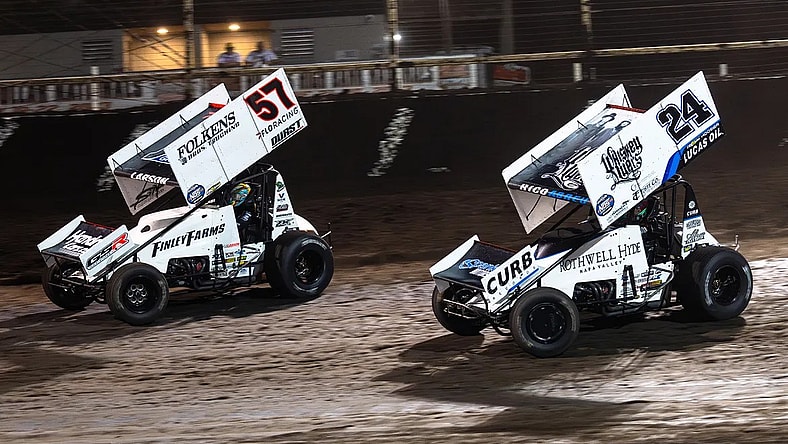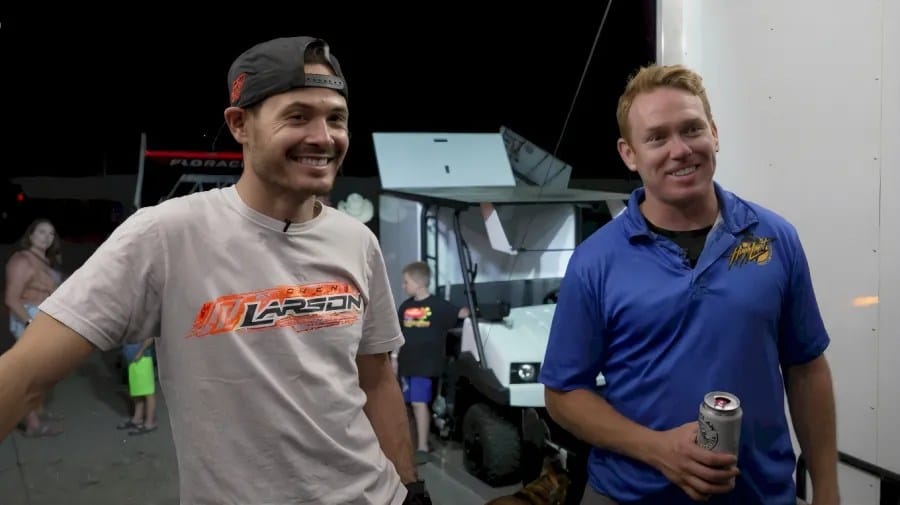
Something very similar to the NASCAR charter system is coming to High Limit Racing, the new Sprint Car Series owned by Brad Sweet, Kyle Larson and FloSports.
As first detailed in the Sports Business Journal, and then to greater detail in Sprint Car Unlimited, the High Limit Sprint Car Series intends to institute a franchise model that will be fully operational by the 2026 season.
In their first season taking on the World of Outlaws hegemony in the national Sprint Car landscape, High Limit already boasts an impressive roster of full-time driver-team combinations:
Brad Sweet, Kasey Kahne Racing No. 49
Kasey Kahne, Kasey Kahne Racing No. 9
Rico Abreu, Rico Abreu Racing No. 24
Spencer Bayston, CJB Racing No. 5b
Corey Day, Sanders Racing No. 14
Jacob Allen, Shark Racing No. 1a
Brenham Crouch, Crouch Motorsports No. 1
Cory Eliason, Ridge Sons Racing No. 8
Justin Peck, Buch Motorsports No. 13
Zeb Wise, Rudeen Racing No. 26
Sweet also slipped during an interview at the Performance Racing Industry trade show that Tyler Courtney and the Clauson Marshall Racing 7bc would be amongst their stars, not a surprise given his personal friendship with both Larson and Sweet.
Larson will also chase a second consecutive Midweek Money championship, the 10 race season within the season, and expects to be on tour for at least 25 or so races throughout the full campaign.

To attract the teams, High Limit has devised a franchise or charter model, one that will eventually cap the number of participating teams in the program and allow those owners to buy and sell their way into the bonuses it provides.
By the start of the 2026 season, High Limit will have issued 10 charters based on the championship results from the first two seasons. The top five teams in the final 2024 standings will be awarded charters on merit, as will the top-five teams in 2025 to have not earned a charter the previous year.
In the meantime, High Limit has a $1 million point fun with the champion team and driver winning $250,000. Midweek Money will award a separate $100,000 total point fund. In all, the series will pay upwards of $5 million in earnings.
Starting in that 2026 season, charter teams will share in 50 percent of the series streaming revenue pool, instead of points money and tow money like in World of Outlaws or any traditional historic championship fund model.
The initial 10 charter teams would receive monthly fixed payments awarded based on average finishing position, feature wins and championships. Similar to the NASCAR charter system, or even the Formula 1 Concorde Agreement, the amount each charter team gets is weighted by performance.
In other words, hypothetically, if Sweet and the KKR team win two straight championships, the KKR 49 charter would have the most value should Kahne ever decide to cash out. Whatever team would, again hypothetically, purchase that charter would then receive the weighted value of that franchise earned by Sweet.
It’s the same way in NASCAR in that the Hendrick 5 charter has the most value over the past three years and the likes of Red Bull, Mercedes and Ferrari receive more based on its historical standing in Formula 1. It’s not an apples-to-apples comparison, mostly because the exact financial structure of the High Limit agreement hasn’t been finalized yet.
Additionally, non-charter teams would still have access to a system that provides tow money and championship money in exchange for their full-time participation, similar to the World of Outlaws model.
The charter system could grow beyond 10 in that first season, but Sweet told Sprint Car Unlimited that it would take a unique interested party to make that happen, and it would require dialogue between the series and the 10 chartered teams.
“We don’t want to dilute the other 10 charters, so we’re going to be mindful of that,” Sweet said. “So if there is a car owner who has been invested in the sport for a very long time and they really like what we are doing in three or four years and want to bring their team over and buy a charter, we will certainly take a long, hard look at that.”
Right now, the model is designed to attract teams to getting in one the ground floor level and earning charters over the next two years so they don’t have to pay for one come the 2026 season.
Sweet also told Sprint Car Unlimited that he concedes he doesn’t have every answer and that the leadership group is still working out the details.
But they have 10 teams already signed up and that number could reach over a dozen before cars unload in Florida in February.
“We have an idea of what we want to accomplish, but it’s going to take time to get every detail out to the public,” Sweet also told Sprint Car Unlimited. “I’m sure we are going to get some things wrong and have to make some adjustments, but I think you’re seeing how much the car owners are believing in what we’re trying to do with how they’re signing up.”
Matt Weaver is a Motorsports Insider for Sportsnaut. Follow him on Twitter.